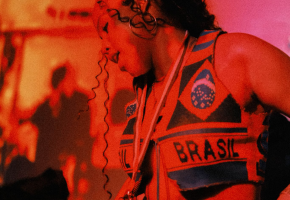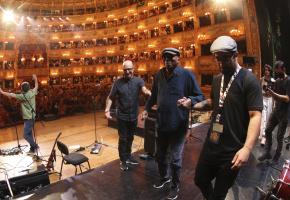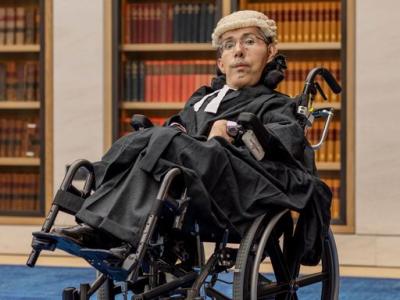Born into Brazilian musical royalty, Bebel Gilberto (55) built a fabulous career nearing now four decades. In that time, she has captivated fans and critics all around the world with a blend of Brazilian styles and electronic and organic sounds, all filtered through her charming personal style.
Joao Gilberto was widely regarded as the ‘father of Bossa Nova’, and her mother was renowned singer Miúcha Buarque de Hollanda, Chico Buarque’s sister, another icon of Brazilian music. Among close family friends were Tom Jobim, Vinicius de Moraes, Caetano Veloso and Gilberto Gil, to name a few who would all make music with her father and were regular visitors to her house.
When was it you became conscious of who your parents were, or your Uncle Chico and their friends?
“When I was very little I guess, but it was just ‘normal’ to me, daddy was playing, mom was singing. I didn’t realise they were ‘artists’, or that I was an ‘artist’ if I sang, you know, I always sang with my father and my mother,” she explains.
When João Gilberto performed in theatres or on TV throughout the 1970s and 1980s, he would often invite a very young Bebel to sing some of his classics. In all of the footage of these joint performances, one thing is consistent – apart from Bebel’s wonderful singing - and that is the love and admiration Bebel has for her dad. This is visible in their performance of ‘Chega de Saudade’ in Rome for RAI TV in 1983 when Bebel was 17.
And yet, despite having her roots at the heart of Brazilian music, Bebel’s interests and style make her difficult to pigeonhole. It is as if she has been in a permanent search that keeps her very close to her Brazilian roots but also always trying new sounds that keep her exploring and innovating.
Only 3 years after that show in Rome, Bebel’s first solo album Bebel Gilberto came out, with mostly original songs by Bebel and her friend Cazuza. The album included 'Eu preciso dizer que te amo' (I Need to Say I Love You) a song Bebel, Dé and Cazuza wrote in one go in a room in Rio de Janeiro. Cazuza would himself grow to become an icon of Brazil’s rock music before dying of AIDS in 1990.
That original recording they made was recovered a few years later, cleaned and released in RED HOT + RIO in 1996, a very popular album to raise AIDS awareness. The celebrated compilation brought together the music of Tom Jobim with Astrud Gilberto, Gilberto Gil, David Byrne, Sting and others.
Bebel, who had left Brazil for New York after Cazuza’s death, catapulted onto the global music scene with the release of their original recording with Cazuza of 'Eu preciso dizer que te amo' in RED HOT + RIO. The song has become since a real classic in Brazilian music.
And Bebels’ popularity just kept growing after the release of Tanto Tempo in 2000. The album brought together songs of her own, like ‘Tanto tempo’, with classics of the ‘old guard’ such as Vinicious and Baden Powell’s ‘Samba da bênção’, Chico Buarque’s ‘Samba e amor’, and Gilberto Gil’s ‘Bananeira’. Modernising bossa nova with electronic sounds, Bebel gained a new younger audience all around the world and positioned her as one of the best-selling Brazilian artists in the US since the eruption of bossa nova in the early 60s.
The following LPs, Bebel Gilberto (2004) and Momento (2007) refined her sound and emphasised her relaxed style and the identification with acoustic lounge. Some of Bebel’s hit songs were released in those years, including the covers of Cole Porter's 'Night and Day' (2007), Carlinhos Brown ‘Aganjú’ and the English version of ‘Baby’, the Caetano Veloso classic.
Those albums also served as springboard for the widely acclaimed and Grammy-nominated 2009 All in One, an album full of organic rhythms and beautiful original compositions like the slow ‘Canção de amor’ (Love Song) and a version of Bob Marley's 'Sun Is Shining'.
Having moved so naturally between acoustic and electronic sounds, and bigger sets and more intimate performances, I wonder what the upcoming UK show will be like.
“The show is a bit of a mix of everything. I’m not playing with electronics this time. We’ve had to reduce our touring crew because of Covid. So, the person who is playing with me is this fantastic Brazilian guitar player, Guilherme Monteiro, who is adapting a few songs from Agora (2020), and we’ll be doing a few other things. It is a great show," she explains. "It’s a duet because when the tour was announced, the number of Covid cases was very high, and this was the only way we could come and play, because it was less risky – the only other option we had was to stay for a third year without playing!”
She also announces that, as well as songs from Agora, she’ll be playing songs from a new album she is in the middle of recording…"a tribute album that I’m making to my dad.”
This is exciting news indeed, for Bebel has only released four studio albums in her long career. After the release of All in One in 2009 and for a decade, she only released one studio album, Tudo (2015). There are her two incredible live recordings. One is Bebel Gilberto in Rio (full DVD show is on Youtube with high quality video and sound. Enjoy!)
The second is the EP Live at the Belly Up (2017), recorded in the Californian music venue, where Bebel performed a few of her classics together with a precious version of Radiohead’s ‘Creep’.
In the years before the release of Agora (2020), Bebel explains that she endured a long period of hardship and loss, having lost her best friend to a heart attack, her mother Miúcha to lung cancer, and then her father, João Gilberto, who passed away in July 2019.
I avoid asking about these painful topics and instead ask how it was working with Thomas Bartlett as her producer (Bartlett is an American pianist and singer who has famously produced Yoko Ono, St. Vincent and Norah Jones among others). On the album, Bartlett’s intervention seems to me delicate, minimalist and perceptible.
“Oh, Thomas. Thomas is a great guy. He makes electronic music himself, and we worked very well together. All the songs in there were all new, and I think they are all beautiful. You know, I never stopped composing during all those years. I was already working with Thomas since 2017 preparing Agora, and then… then it was hardly noticed”, Bebel finishes, lamenting the bad timing of the release in the middle of the pandemic.
Perhaps it wasn’t such bad timing. Agora is such an elegant and charming album that the audiences are slowly starting to notice it. There are some real gems in it, like the playful and upbeat ‘Na cara’ (In the Face), in a duet with fellow musician Mart’nália, or the reflexive ‘O que não foi dito’ (What Wasn’t Said), which Bebel wrote for her father.
Looking forward to Bebel's performance I begin listening to her performing her uncle Chico Buarque’s classic ‘Samba e Amor’, in collaboration with Chico Buarque himself. I notice how their comfort in each other’s company only compare to the feeling one gets when Bebel performed with her dad as a child. And at the same time I think how wonderful it is that. from the daughter of Bossa Nova has sprung this wonderful artist and, one could say, the mother of quite another Brazilian musical movement: Bossa Electronica
Bebel is playing on Sunday 27 March at the Southbank Centre (doors 7.30pm) at the Royal Festival Hall, Belvedere Road, SE1 8XX, southbankcentre.co.uk/venues/royal-festival-hall.


















